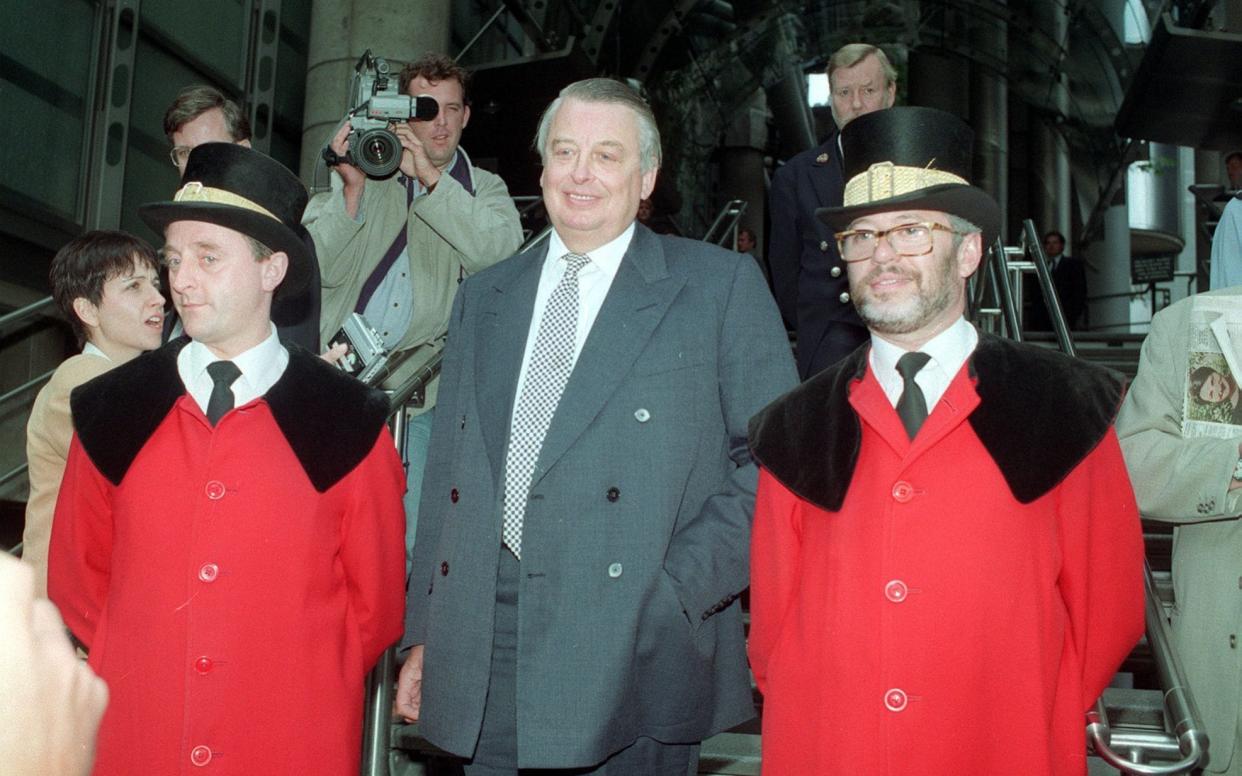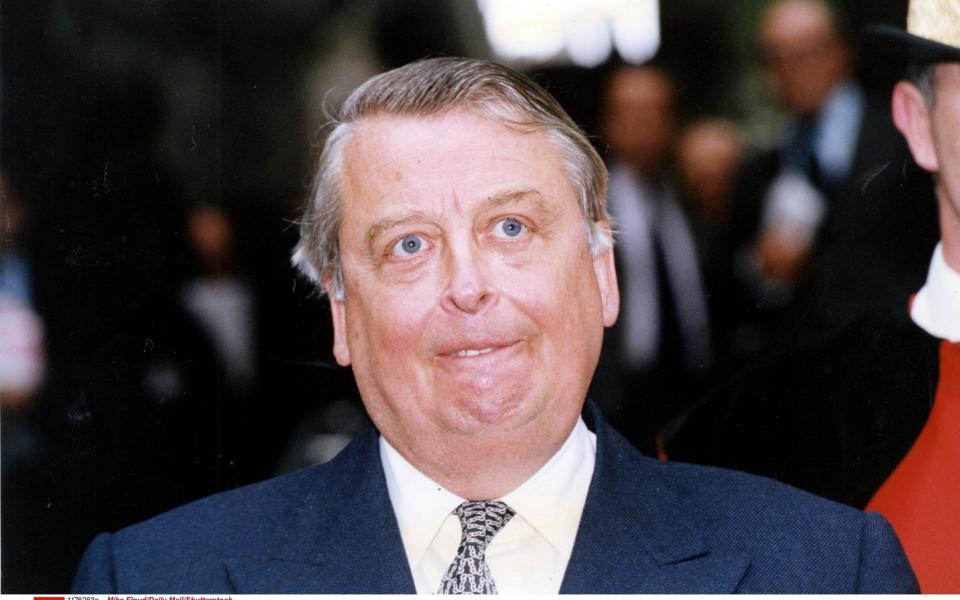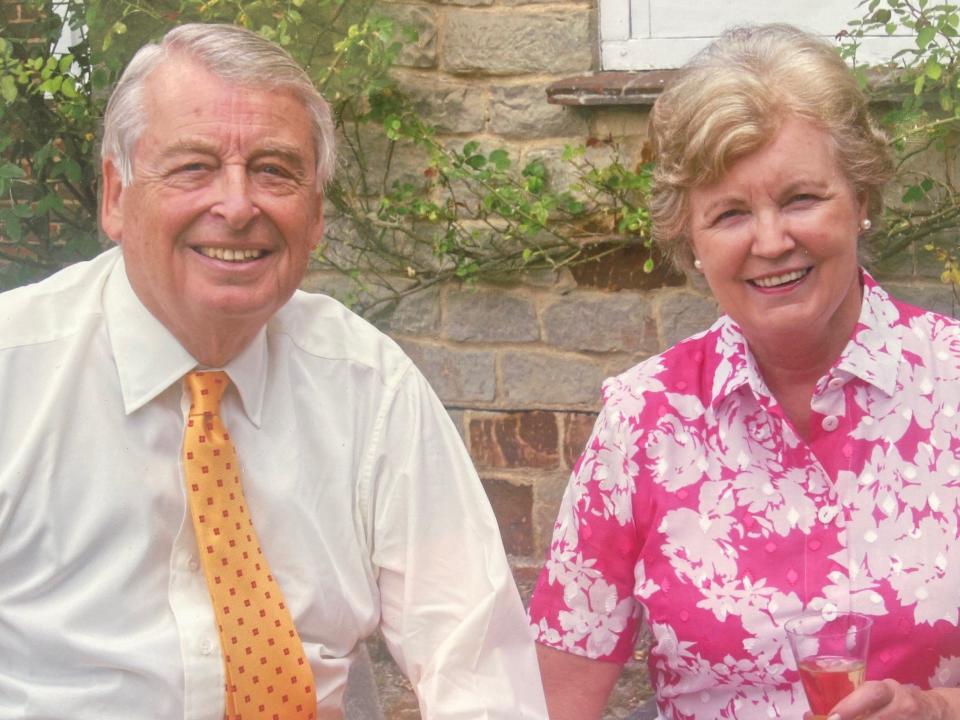David Coleridge, chairman of Lloyd’s insurance market during turbulent years – obituary

- Oops!Something went wrong.Please try again later.
- Oops!Something went wrong.Please try again later.
David Coleridge, who has died aged 88, was chairman of Lloyd’s of London during what he called “one of the darker chapters” in the insurance market’s history.
An urbane Old Etonian who had spent all his working life in Lloyd’s, Coleridge was variously described as appearing to survive on a diet of “port and school puddings” and concealing steely determination “behind a tired teddy-bear look”.
Though sometimes accused of abrasiveness he was a courteous listener, and was considerably more amenable to market reform than his immediate predecessors, to whom history has attributed much more of the blame for Lloyd’s long chapter of problems.
But he was still seen at the time by many disgruntled Names – the market’s 30,000-plus underwriting members, whose liability was unlimited – as a representative of Lloyd’s Establishment, which habitually downplayed the market’s bad habits and regulatory weaknesses.
He took over as unpaid chairman of the council of Lloyd’s at the beginning of 1991, having previously served three one-year terms as deputy chairman. Trouble was brewing on several fronts: US court judgments in asbestosis cases were creating billions of dollars worth of reinsurance claims, as were a series of hurricanes and major industrial accidents.

At the same time, accusations of malpractice within Lloyd’s were rife, particularly in relation to profits made by insiders at the expense of external Names; and those Names who were free to go – those not caught in “open” underwriting years with mounting losses, that is – were deserting the market in droves.
Coleridge recognised the need for action, and formed a task force under the chairmanship of David Rowland (head of the broking firm Sedgwick) to recommend a way forward.
He also strengthened the hardship committee which tried to help Names who faced ruin, and instituted an automatic review process for syndicates with unusually heavy losses. But through no fault of Coleridge’s, these initiatives came too late to quell a rising clamour of bitterness and criticism.
Against this unhappy background it fell to Coleridge to announce collective losses for the 1988 underwriting year (Lloyd’s results being announced three years in arrears) of £510 million.
This was the first deficit after two decades of profits, and Coleridge’s firmly presented view was that it had more to do with bad times in the insurance industry worldwide than with specific problems in Lime Street: but he struck an unfortunate note, telling an interviewer that many Names would “make a lot of fuss … Most of the people who are bitching and whingeing are doing it because they don’t like losing. I understand that. It’s human nature to only want to win.”
At Lloyd’s annual meeting a few weeks later he was more contrite, shedding tears when a vote of thanks to him was proposed at the end of four hours of angry debate. But still worse was to come through the following winter, as dissident Names pursued a series of legal actions, and Coleridge faced an onslaught of hostile questioning from a Commons committee: forced on to the back foot, he could only repeat his mantra that “there are a lot of people who can’t tell a loss from a scandal”.
At the June 1992 annual meeting, attended by 5,000 Names, he had to announce losses for 1989 of £2 billion, vastly exceeding previous official estimates.
This was followed by the publication of two reports commissioned by Rowland’s task force: Sir Jeremy Morse recommended a more professional regulatory structure which would include a salaried chairman; and Sir David Walker’s inquiry into the so-called LMX spiral (a reinsurance practice which concentrated risks – and losses – into syndicates of external Names) was scathing about the way the market was run and the standards of conduct among some of its operators.
Vociferous dissidents went on to call an extraordinary general meeting to debate a motion of no confidence in Coleridge’s council. A postal ballot of Names resounding defeated the motion, but by then Coleridge had announced he was stepping down as chairman and had nominated David Rowland to succeed him.
“I didn’t wish to be the last chairman of Lloyd’s,” Coleridge said later. “There were some people who were predicting that the market was in ultimate meltdown. I realise that we have damaged very seriously a section of our community and for that I am very unhappy. But the market is now set to go forward again.”
As indeed it eventually did, under a very different structure, after several more rounds of reform.
A great-great-great-great-nephew of the poet Samuel Taylor Coleridge, David Ean Coleridge was born on June 7 1932 in Bombay, where his father was a cotton broker. The family returned to England when David was five, and his father – who was also a Name at Lloyd’s – worked on the Liverpool cotton exchange.
David was educated at Eton, where he was an Oppidan scholar, a member of Pop and, in rowing, Ninth Man in the Monarch. Having been turned down for National Service in the Green Jackets because of flat feet, he went straight into Lloyd’s at 18 to work for a small broking firm, Glanvill Enthoven, whose clients were chiefly woollen mills in the Midlands.
After seven years he moved to the underwriting firm of R W Sturge & Co, where he became a director in 1966. In 1975 he and two partners bought out the Sturge family, and Coleridge became chairman in 1978. Having been rather sleepy in earlier days, the Sturge group under Coleridge’s leadership became one Lloyd’s largest and most successful operators, and the first to list on the Stock Exchange.
Coleridge was a “working Name”, and a participant (along with many fellow council members during the 1980s) in the system of “baby syndicates” which often provided handsome profits for Lloyd’s insiders. In an interview in 1991 he cheerfully acknowledged that he had made “huge amounts” of money in the market, and his prosperous demeanour was particularly galling to some of his critics.
Prominent among the critics was the Conservative MP Paul Marland – who had sustained heavy personal losses, and who made vitriolic attacks on him under cover of parliamentary privilege. Coleridge remained unruffled, and made no direct response.

But a riposte came from the pen of his journalist son Nicholas, writing in The Spectator, who quoted his father as saying: “Well, I can’t help feeling sorry for [Marland] really. He’s made some awfully odd decisions, poor chap, but I suppose if you become used to getting a large cheque every year, and then you’re asked for some of it back, it must be distressing.”
David Coleridge, who was known for his kindness and lack of vanity, enjoyed good wine, golf, racing, 18th-century watercolours, and gardening at his country home in Sussex. Nicholas Coleridge, in The Glossy Years, described his father as “wonderfully relaxed in his own skin”: even at the height of his Lloyd’s battles, he was “miraculously unrattled by it all”.
He married, in 1955, Susan Senior, whom he had met at a cocktail party; she was the daughter of a director of the Cunard shipping line and granddaughter of Lord Joicey, a Northumbrian coal-owner. She survives him along with their three sons: Timothy was mayor of Kensington and Chelsea, while Christopher is an entrepreneur in Los Angeles; Nicholas was president of Condé Nast and is chairman of the V & A.
David Coleridge, born June 7 1932, died December 26 2020

